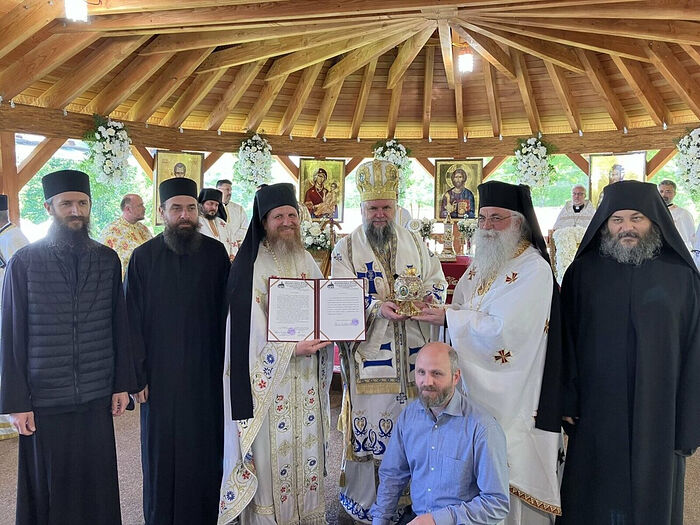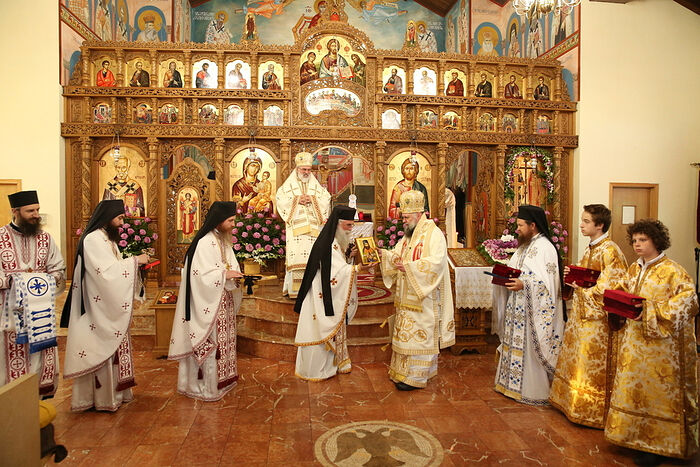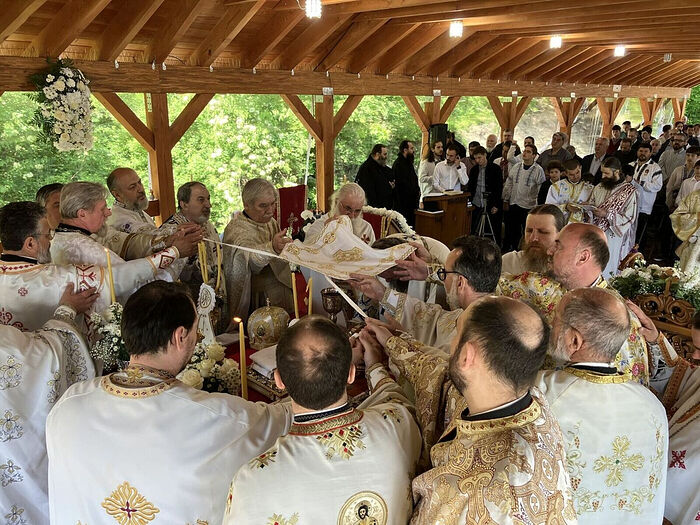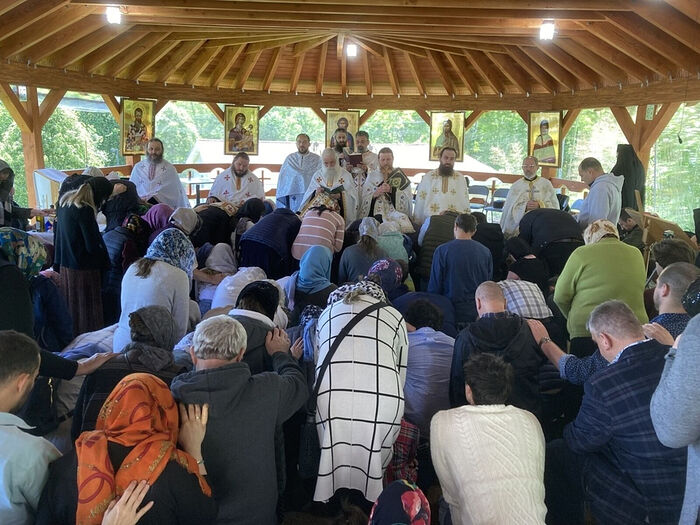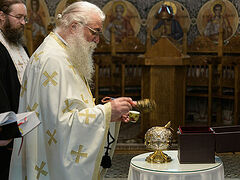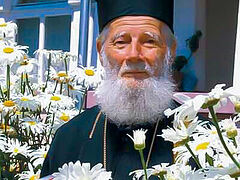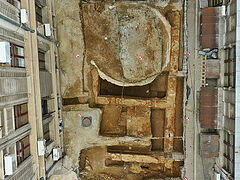Middletown, New York, June 6, 2023
From May 17 to June 1, a delegation from Romania’s Putna Monastery, headed by Abbot Archimandrite Melchisedec Velnic, visited various churches and monasteries in the United States.
The delegation brought with them a piece of the holy relics of the recently canonized St. Jacob of Putna, Metropolitan of Moldavia (†1778), to gift them to a Romanian Orthodox monastery in New York, reports the Romanian Orthodox Metropolia of the Americas.
The delegation first visited Sts. Constantine and Helen Metropolitan Cathedral in Chicago to celebrate the church’s 20th anniversary, and the people were blessed to venerate the relics of St. Jacob.
Following Great Vespers on the eve of the anniversary, Fr. Melchisedec spoke about St. Jacob:
The saints are the friends of God, they are those who adorn the house of God. St. Jacob of Putna, in all his time as Metropolitan of Moldavia from 1750-1760, would identify with the hardships, the joys, and the problems facing his country. In that time, our ancestors were greatly weighed down by taxes upon taxes. In 1757, he managed to place a curse so that none of the rulers of Moldavia would dare oppress the people with these taxes. In that same period, he founded the first rural school, he attended to the printing of the first school primer, where in the preface he wrote: “Education is like the sap of a tree. If children receive a good and healthy education, then they will grow up to be upright and of sound mind.” In 1760, he resigned from his position as Metropolitan of Moldavia. Theodore Callimachi, the new ruler, attempted to force Metropolitan Iacob to life his curse, but the saint said: “Rather than lifting the curse, I’d better leave behind the office of metropolitan.” He retired to Putna Monastery, where he first directed his attention to the miracle-working icon of the Mother of God, which he plated in silver. Afterwards, he renovated all of the monastery’s structures.
But what drew St. Jacob closest to God? His boundless love, the enlarged heart that he had, the unceasing prayer for which he strove. He wrote, among other things: “Prayer is like the sun, for wherever the sun shines, there is life.” When we forget to pray, or when we pray only as routine, what’s our inner state? We become foreign. And we remain the same, without being transformed, without anything changing within us. But when we pray a little more attentively, then we see how the light shines within us. How beautiful prayer is, but also how neglected in our day! And what is prayer? It is the mind’s communication with God and, as St. John Climacus says beautifully, the sustainer of the whole world. Therefore, my advice tonight is this: may we pray more, may we love the adornment of God’s house, may we make our heart into a house of God. How? By calling often upon the name of Jesus. The name of the Lord comes with a certain power that sanctifies me, that deifies me. It enlarges my heart so that I may bring before God both those whom I love and those whom I don’t love, because the greatest thing is to love the wound and the one who wounded you, as Fr. Arsenie Papacioc would say.
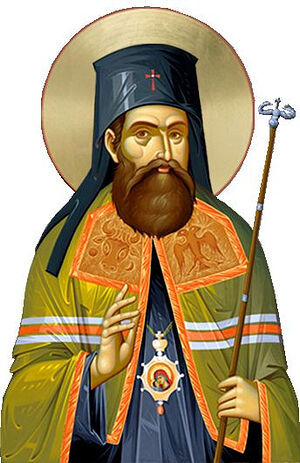 Photo: doxologia.ro Fr. Melchisedec also exhorted the faithful to always flee to St. Jacob in times of need.
Photo: doxologia.ro Fr. Melchisedec also exhorted the faithful to always flee to St. Jacob in times of need.
The delegation then traveled to St. Demetrios the New Monastery in Middletown, New York, for the feast of the Ascension of Christ. The Hierarchical Divine Liturgy was celebrated by His Eminence Metropolitan Nicolae together with Fr. Melchisedec and many other clergy.
The visiting abbot again spoke about St. Jacob, adding that he is a powerful intercessor for families:
My beloved, at the request of His Eminence and of Fr. Abbot Ieremia, we have brought a piece from the right hand of St. Jacob of Putna. St. Jacob of Putna was an advocate and defender of families. Therefore, I have only this message to share with you: St. Jacob of Putna sacrificed himself for the families in his time, for the well-being of the families in Moldavia. And when he resigned from his metropolitan throne, he did so also out of love for families. [...] St. Jacob of Putna urged parents to send their children to school. Today, we are witnessing a decline in the level of education in all countries and in all subject matters. The youth no longer love learning, as they did in the interwar period or even in the 70s, 80s, and 90s; books are no longer loved as much. Everyone prefers to win something fast. Maybe you have heard that in Romania, the educators are protesting, and the students have declared that they stand by their teachers. This means that some have understood that the level of education has declined. Well, St. Jacob attended to the education of the youth.
Then the relics of St. Jacob were formally gifted to the monastery, where they will remain for the veneration of the faithful.
Following the festal meal, Abbot Melchisedec held a conference entitled, “A Conversation with Father Abbot. About Our Fathers in the Lord. About Being a Christian Today,” in which he spoke about a number of Romanian elders whom he knew personally, including Fr. Sofian Boghui, Fr. Arsenie Papacioc, Fr. Paisie Olaru, Fr. Elder Cleopa, and others.
Holy Unction was also served with seven priests the day after the feast. All the services included a homily from the visiting Abbot Melchisedec.
***
St. Jacob (1719-1778) was the most distinguished bishop and pastor of the Moldovan Church of the eighteenth century. In 1731 he entered into the monastic ranks at Putna Monastery, being elected abbot in 1744. He served as Bishop of Radauti from 1745 to 1750, and of Moldova from 1750 to 1760, during which time he labored tirelessly to increase the spiritual level of his flock, printing spiritual literature for all ages and establishing spiritual schools. In 1760 he retired again into monastic simplicity for the remaining eighteen years of his life.
The crypt of St. Jacob was opened on June 15, 2016. His bones were found to have a ruddy color, considered a sign of holiness and perfection in the Lord. St. Jacob was buried simply and humbly, wearing only his monastic garments and a simple silver cross, despite bearing the episcopal dignity of a metropolitan during his life. Thus he went to the grave in the same spirit of humility that characterized his entire life.
Follow OrthoChristian on Twitter, Vkontakte, Telegram, WhatsApp, MeWe, and Gab!

